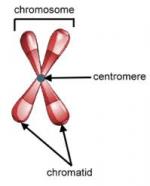|
This section contains 759 words (approx. 3 pages at 300 words per page) |

|
A chromosome consists of the body's genetic material, the deoxyribonucleic acid, or DNA, along with many kinds of protein. Chromosomes contain the genes, or segments of DNA, that encode for proteins of an individual. When a chromosome is structurally faulty, or if a cell contains an abnormal number of chromosomes, the types and amounts of the proteins encoded by the genes are altered. Changes to proteins often result in serious mental and physical defects and disease.
Within the chromosomes, the DNA is tightly coiled around these proteins (called histones) allowing huge DNA molecules to occupy a small space within the nucleus of the cell. When a cell is not dividing, the chromosomes are invisible within the cell's nucleus. Just prior to cell division, the chromosomes uncoil and begin to replicate. As they uncoil, the individual chromosomes take on a distinctive appearance that allows physicians and scientists to classify...
|
This section contains 759 words (approx. 3 pages at 300 words per page) |

|


